Faith in a Better Climate Future
Air Date: Week of May 9, 2025
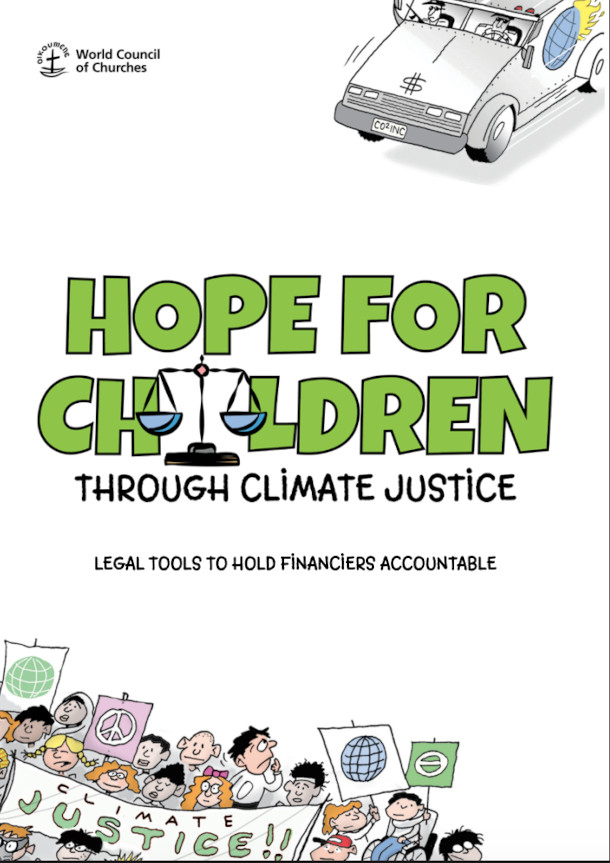
“Hope for Children Through Climate Justice” is a handbook written by the World Council of Churches. (Image: World Council of Churches)
The children of today and tomorrow are not to blame for the climate crisis and yet are likely to suffer it the most. In hopes of remedying this injustice the World Council of Churches has published “Hope for Children Through Climate Justice,” a handbook for communities of faith looking to hold financial actors accountable for their fossil fuel investments. Frederique Seidel is their senior program lead on children and climate and she spoke with Host Jenni Doering.
Transcript
O’NEILL: It’s Living on Earth, I’m Aynsley O’Neill.
DOERING: And I’m Jenni Doering.
Climate disruption poses an existential threat to the future of children around the world, with wildfires, floods, extreme heat and more putting lives in peril. The children of today and tomorrow are not to blame for this crisis, and yet, future generations are likely to suffer it the most. And for some people of faith, that is an unacceptable moral failing, and as such, they feel called to remedy this injustice. The World Council of Churches represents half a billion Christians and has published “Hope for Children Through Climate Justice,” a handbook for communities of faith looking to hold financial actors accountable for their fossil fuel investments. Frederique Seidel is the Senior Program Lead on Children and Climate at the World Council of Churches and she’s here with us now. Frederique, welcome to Living on Earth!
SEIDEL: Thank you very much. I'm very pleased to be here.
DOERING: So how would you describe this handbook, and why did you and your colleagues create it?
SEIDEL: This handbook is a source of hope for children. The main goal is really to save children's lives and to create perspectives for children to project themselves in a beautiful future. And right now, we tackle one of the most urgent matters for child protection, and that is the root causes of global warming. North and south, east and west, children everywhere have these fears when they see that there is massive funding invested into fossil fuel expansion, while science tells us that over 75% of greenhouse gas emissions are caused by fossil fuels. So yes, this handbook is there to help tackle this root cause and use, very simply, the laws which allow human beings to have their right to life respected. And we show in this handbook how in the different countries, people of faith can seize the very basic legal frameworks to defend the younger generation’s right to a livable future.
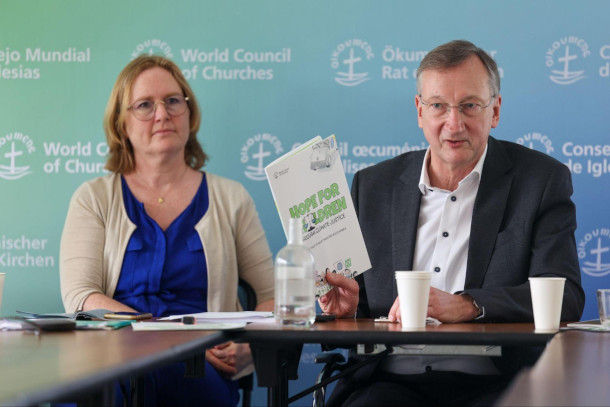
Frederique Seidel, World Council of Churches Senior Program Lead on Children and Climate (left) and Peter Prove, WCC Director for International Affairs (right), at the handbook launch in April 2025. (Photo: Ivars Kupcis/WCC)
DOERING: Now, the World Council of Churches includes many different Christian denominations, from Orthodox to Anglican, Baptist and Lutherans. How does its religious and ethical framework influence how it approaches climate justice?
SEIDEL: Yes, so the main reference for this work were science and the Bible. So we have crafted it together with leading scientists, with lawyers, but also with theologians who have helped us for every single chapter to anchor it in the gospel. So this is very important, as the mandate of the World Council of Churches is really to support its member churches in 120 countries representing over half a billion Christians. And as you said, their backgrounds and denominations are of a great variety. So we focus on the common denominator of all the churches, but also of all the religions, we work very much interfaith, and the most important common denominator is the right to life and to a healthy environment.
DOERING: So I think I hear you saying that even across many different countries, you know, where your member churches exist, there are shared human rights that are enshrined in the law, in the constitutions, and that using those basic rights as a basis for bringing legal action to challenge what's going on, that that can actually be a really powerful tool.
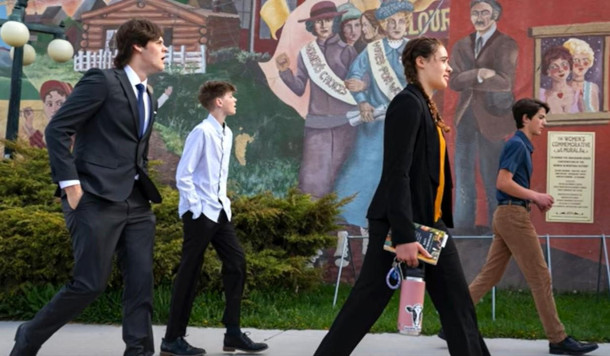
Frederique Seidel says that many of the plaintiffs in the Held v. Montana case felt their carefree childhoods were stolen by climate anxiety. (Photo: Our Children's Trust #youthvgov, Wikimedia Commons, CC BY 3.0)
SEIDEL: Exactly. There is, for example, the UN Convention on the Rights of the Child, and it has, since two years ago, a so-called General Comment 26 on Children and Climate, which is an authoritative guidance for governments on the rights of children when it comes to climate. So it is looking into that, but also into many international human rights frameworks which are not used enough to protect children. We also show in this handbook that there are many good examples of fossil fuel companies which have transitioned completely to renewables without dismissing any employees. This is a very important aspect, because this handbook is not against anyone. It is not even to target fossil fuel companies. It's just to show how to help them transition to renewable energies faster.
DOERING: And so what's the role for churches here, your member churches, what roles are they playing in this fight for climate justice?
SEIDEL: So this handbook is inspired by cases which were developed by churches, including in the US, but also in South Korea and Switzerland, in Sweden and in some African countries too. We have seen churches really at the forefront of legal action, because people of faith have a particular responsibility anchored in the Bible when they see something happening that is creating a lot of suffering. You may have heard of Dietrich Bonhoeffer, who has said that if you see someone driving into a crowd of innocent people, you cannot just watch and then pick up the dead and heal the wounded. You must actually take the steering wheel out of that driver's hands, and that is the goal of this handbook. So also to bring those who are currently driving into this wall of a future at huge risk, to make them change policies before it is too late. We also invite in this handbook people to observe if they may be victims of disinformation, as we don't want actually anyone to go to court. That's not the goal of the handbook. The goal is to make the policies change before the cases actually reach the courtroom.
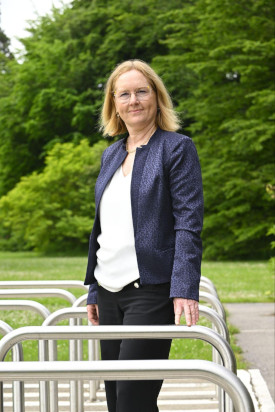
Frederique Seidel is the Senior Program Lead on children and climate at the World Council of Churches. (Photo: Alain Grosclaude)
DOERING: Well, wait a minute, explain that to me. I mean, it seems like you're trying to hold those responsible for the climate crisis accountable, including financial actors, but you're saying you don't actually want these cases to go to court.
SEIDEL: Exactly, because we have seen how, in many instances, by simply having a case being developed, many of the companies or financiers, they do not want to see headlines of them being targeted, especially not by moral leaders and institutions of faith. So we have a case in Australia, actually, a shareholder action case where yes, every single request was fulfilled before the case reached the courtroom. So that is the ideal scenario where people then realize that what they're doing is threatening lives, and that they even can make more money by investing into renewable energies.
DOERING: To be honest, I have to say, Frederique, that you know, picturing fossil fuel companies or picturing financial actors, in this case, as being so cooperative, the ones that are funding the fossil fuel industry, feels hard to picture, at least in the US at this moment. What gives you the faith that this is really a collaborative exercise, and not just, you know, parties at odds and having to take it to court?
SEIDEL: Well, what gives me a strong faith is just the experience from the past that many things seem unrealistic or impossible. I come myself from a German and French background, and my grandfather, who was a French war prisoner tortured by the Nazis, he said, in 1943, if someone would have told you, Germany and France will become best friends and create be the dynamic for the European Union, people, that would have just said, it's ridiculous, it's impossible. Another example is the Berlin Wall, you know, which separated Germany into two parts. Nobody at all would have ever believed that that wall would disappear, and that change was also driven by the churches. And so, yes, what needs to happen, according to science, is something which, right now, all the opposite is happening, but we have seen many amazing testimonials, even of leaders of big, big media companies, who have acknowledged that they really believed that climate change was just one theory and that it was not necessarily true. But then they understood the IPCC report, and they saw that this was real, and they regretted to have ignored global warming for so long. And many of these testimonials come after conversations with their children or grandchildren. So we see quite amazing transformation in people, and this handbook encourages for every leader in the world who is responsible for such investment choices to have a quick check up with their own conscience. And our goal is not to, as I said, sue anyone per se.
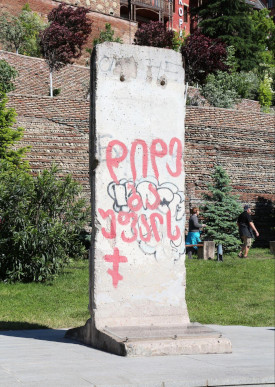
Segment of the Berlin Wall in Tbilisi, Georgia. (Photo: Bernard Gagnon, Wikimedia Commons, Public Domain)
DOERING: I understand that you work alongside children of different ages in having some of these tough climate conversations. Can you give us a little bit of insight into how they're feeling about the climate crisis and their hopes or concerns about the future?
SEIDEL: Yes, so most of the young people who have urged us to help in this area of work, they are suffering a lot. You may have seen the Montana case in the US, which was successful, which was a youth led climate litigation. When you see the images, they are all smiling about the success, but when you talk to the plaintiffs, they do explain how this has really spoiled their youth and their childhood, that they felt so stressed that there was no way to have any light heartedness anymore for playing football or dancing. Every single minute has to be invested in saving their future, and this project aims to take away a far too heavy burden from childrens’ shoulders. So we do focus on adults, we would like adults to take the lead, and for those children who already know and who understand the science, we welcome their collaboration, but when we would never go to a child or a teenager and make them collaborate. We believe that it's important for children to have this light heartedness and benefit from the right to play and that they can trust adults will take care of fixing what is threatening everyone's lives.
DOERING: It’s a very interesting distinction that you're making, to specifically say, we're doing this because of the children, but we want them to be able to have a childhood, and this isn't their responsibility.
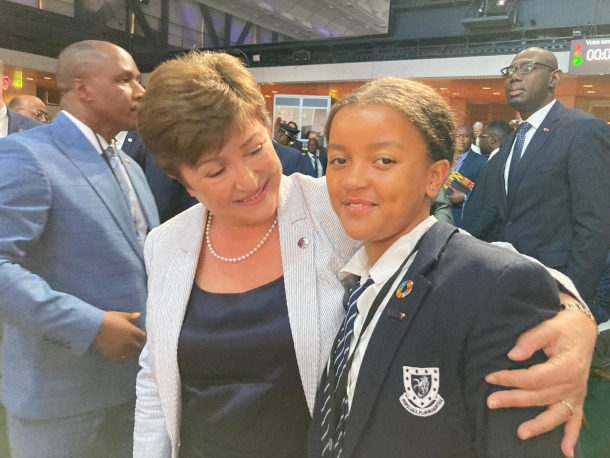
Kristalina Georgieva (left), managing director of the International Monetary Fund, stands with Ellyanne Wanjiku of Kenya (right), who prayed her way into a meeting of world leaders at the New Global Financing Pact in June 2023. (Photo: Courtesy of Frederique Seidel)
SEIDEL: Yes, and I also want to share an example from a 12-year-old girl, Ellyanne Wanjiku from Kenya who actually contacted me asking if I could help her and 10 other children from north and south to meet with Emmanuel Macron, the president of France. And I did think that was not a realistic request, but I agreed that we meet next to the new Global Financing Summit, where Macron was convening all the world leaders, and we then helped them craft a message for the world leaders. But this girl, Ellyanne Wanjiku, really enabled us to enter the main room where all the leaders were. So she looked into the eyes of every single security guard and prayed her way in. So suddenly we were standing there with, including the US leaders. And I think this is an example to show how children can also move mountains through their faith, and they have such a strong wish to have a livable future that they're ready to try so many things, and often they just are successful. So I think there were many leaders who were touched and moved by the fact that this girl from Kenya had made all her way to this place and had just really prayed her way into that room, and she was accepted. So that was quite an experience.
DOERING: Frederique Seidel is the Senior Program Lead on Children and Climate at the World Council of Churches. Thank you so much for taking the time with us today.
SEIDEL: Thank you very much. All the best to you.
Links
World Council of Churches “Hope for Children Through Climate Justice”
Living on Earth wants to hear from you!
Living on Earth
62 Calef Highway, Suite 212
Lee, NH 03861
Telephone: 617-287-4121
E-mail: comments@loe.org
Newsletter [Click here]
Donate to Living on Earth!
Living on Earth is an independent media program and relies entirely on contributions from listeners and institutions supporting public service. Please donate now to preserve an independent environmental voice.
NewsletterLiving on Earth offers a weekly delivery of the show's rundown to your mailbox. Sign up for our newsletter today!
 Sailors For The Sea: Be the change you want to sea.
Sailors For The Sea: Be the change you want to sea.
 The Grantham Foundation for the Protection of the Environment: Committed to protecting and improving the health of the global environment.
The Grantham Foundation for the Protection of the Environment: Committed to protecting and improving the health of the global environment.
 Contribute to Living on Earth and receive, as our gift to you, an archival print of one of Mark Seth Lender's extraordinary wildlife photographs. Follow the link to see Mark's current collection of photographs.
Contribute to Living on Earth and receive, as our gift to you, an archival print of one of Mark Seth Lender's extraordinary wildlife photographs. Follow the link to see Mark's current collection of photographs.
 Buy a signed copy of Mark Seth Lender's book Smeagull the Seagull & support Living on Earth
Buy a signed copy of Mark Seth Lender's book Smeagull the Seagull & support Living on Earth

